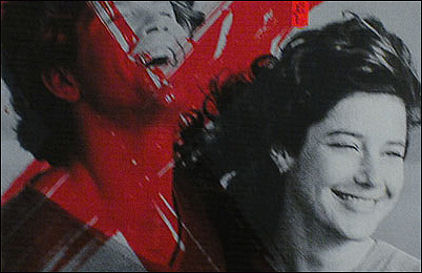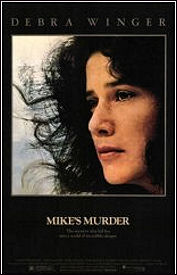The Bank Job‘s somewhat disappointing showing this weekend reminded me again how people don’t seem to support solid, commendable mid-range movies much anymore. 90% of the creme de la creme Rotten Tomatoes gang gave it a thumb’s up, and the impact was negligible. For reasons that may seem to defy precise linkage, this reminded me this morning of Mike’s Murder, a haunting James Bridges drama that didn’t sell enough tickets either when it opened in March 1984.

And yet it gets better in my head the more I think back on it. Which I do from time to time.
I’m mentioning Mike’s Murder because, like David Jones‘ Betrayal (’83), it was issued eons ago on VHS but is still not on DVD. This situation should be corrected by Warner Home Video. It’s way too good to be buried or shunted aside.
It didn’t register very strongly in the mid-Reagan era because it didn’t shoot for the stratosphere or deliver fierce visceral thrills, which is what audiences seemed to be responding to more and more back then. (The ’70s heyday had drawn to a close, and blunt-impact movies — sci-fi epics, actioners, tits-and-zits comedies — were gaining big- time.) But it handled itself and its subject — the L.A. drug-dealing scene — in a way that was almost deceptively powerful. It’s a somber little creep- out thing.
And it had some unusually penetrating performances from Debra Winger, Paul Winfield, Mark Keyloun (a newcomer at the time who seemed to work mostly on television after Mike’s Murder and who retired from acting in the early ’90s) and Darrell Larson. There was real ache and loneliness in their emoting. Which lent unusual gravity to a story that structurally was only a murder-mystery.
The good things about Mike’s Murder eluded several respected critics when it opened 24 years ago. N.Y. Times critic Vincent Canby didn’t even give it the courtesy of a full- length review when he dealt with it on 3.9.84. Pauline Kael, however, defended it, and I wish I could find at least a fragment of her New Yorker review online. I remember how her review noted that a N.Y. Times TV page editor had written “skip it” in response to an airing of Mike’s Murder on a New York-area station, and Kael saying in response, “Please, don’t skip it.”

Winger plays Betty, a practical minded but lonely bank teller living in Brentwood. She falls for Mike, a light-hearted tennis instructor (Keyloun) who spends a single night with her after a brief flirtation. He’s obviously immature and irresponsible, not returning calls and whatnot, but she can’t let him go. Then after he doesn’t show up for a date, Betty learns to her shock that he’s been slain by drug dealers. And so she decides to assuage her pain by looking into his sordid past to learn what happened, and the journey she takes into the toney, drug-dealing underworld that gives Mike’s Murder its strange, unsettling edge.
An IMDB posting by James Sanford says that Mike’s Murder has “a beautifully evoked, vaguely creepy atmosphere that hangs over every scene….the crime that sets the story in motion remains unsolved at the end, and perhaps that’s how it should be. It’s not important who really killed Mike Chuhutsky, Bridges seems to be saying. Not when it’s so obvious what killed him.”
David Ehrenstein explained the genesis of Mike’s Murder in this ’04 Advocate article.
It’s been over ten years since I’ve seen Mike’s Murder, but I remember three things in particular: (a) the look of immense sadness on Winfield’s face as his character, a wealthy gay man who had a thing for Mike, considers the character flaws that led to the young man’s death, (b) the horrific howl that comes out of Larson, who plays Mike’s not-very-smart best friend, as he’s about to be murdered by thugs for having stolen cocaine from a major dealer who lives in the hills, and (c) a nifty little sequence in the very beginning that shows a hamburger being prepared at Tomy’s on Pico Blvd.
For whatever reason I don’t recall anything about Joe Jackson‘s score. Was it mainly a series of songs with a few stabs at mood and atmosphere? That’s what an online description says but my mind’s a blank.
HE to WHV’s Ned Price and George Feltenstein: please do the right thing and issue this film on DVD before too much time elapses.
